Film Name: 深海 / Deep Sea
After the screening of Deep Sea last night, about a third of the people there couldn’t help but applaud (me included), and on the way out of the theater to leave, I heard a few voices that didn’t buy the movie ……
It’s normal that some people like it, some people are bored with it, and even the word of mouth will be polarized, but what’s amazing is that these two emotions can exist harmoniously in the same film.
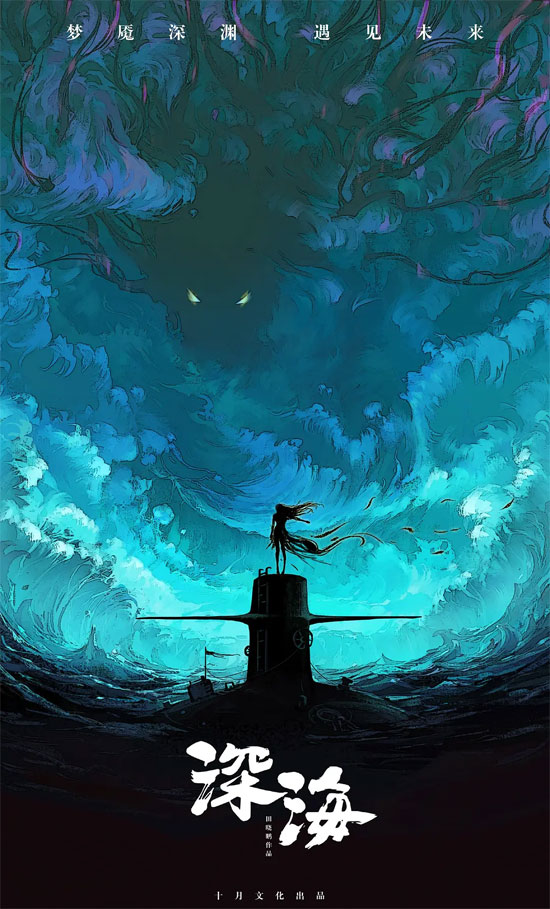
Because this is a “stream-of-consciousness” movie, it requires the audience to have enough patience to get through the seemingly chaotic fluctuations in the first half of the movie before they can feel the emotional outbursts in the last half hour.
I admire director Tian Xiaopeng’s ability to restore her own dreams from the perspective of a depressed little girl, and to paint the dark undertones with colorful splashes – Deep Sea is far more authorial than commercial, and I’m glad to have seen her on the big screen.
[Friendly reminder: there will be spoilers below, so read at your discretion].
As is my usual habit, I should come up and brag about the special effects graphics before talking about the story themes, but not this time because it’s hard to separate the two and Deep Sea is definitely a story experience first.
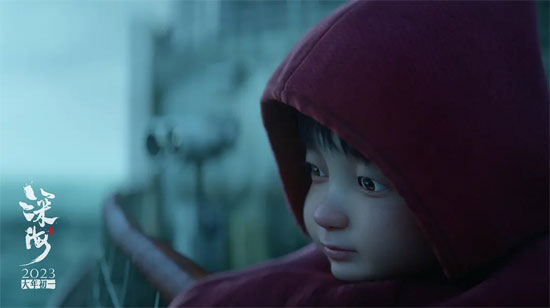
The plot of the movie is not complicated: a 9-year-old girl from a divorced and reorganized family, Samurai, falls into the sea on a cruise ship, and then goes on a dreamy journey to the deep sea, where she finally finds herself.
The story looks very similar to Life of Pi, but the difference is that Life of Pi has relatively clear logical nodes and character symbols, whereas Deep Sea is a potpourri of elements thrown into the mix.
After a brief explanation of the characters’ backgrounds at the beginning of the movie, the movie quickly moves on to the plot of Deep Sea Hotel, which is hard to describe.
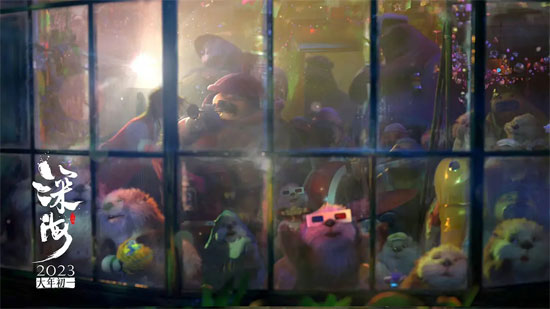
First of all, it is surely a visually gorgeous and absurd fantasy journey, with images full, full of details, bright colors, even the saturation is very rich and sweet, and different textures such as oil paintings, comic strips, ink drawings and sand paintings are given in a serving of 3D animation delicacies.
However, compared with the full-bodied images, the film’s narrative and characters are often in a state of dropout, with unclear behavioral logic and a plot that seems to move forward in a topsy-turvy manner.
Therefore, the first 80 minutes of the movie gave me the impression that the images were too crowded and the pace was disorganized, so much so that the “daily life of a deep-sea restaurant”, which should be beautiful, lovely and excellent, seemed a bit noisy and disturbing – until the last 30 minutes came.
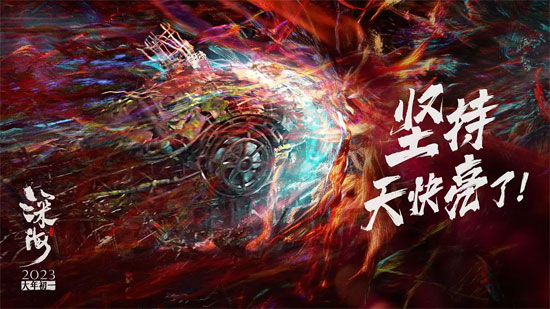
This off-beat fantasy journey is in fact the other side of the world between life and death, which is constructed on the basis of what he saw and heard on the cruise ship and his deepest obsession when his life is in danger after he fell into the sea.
Almost all of the fantasy elements have realistic information clues to follow, but they are wrapped into a non-linear narrative “randomly fabricated” story, so it seems confusing, for example, Nanhe was already injured before he jumped into the sea to save the others, but Samurai only has a brief impression of this in the middle section.
If we consider the whole story based on Samurai’s stream-of-consciousness fantasies, the “emptiness” in the first part of the story is the basis for the “fullness” in the second part of the story.
So, was this intentional on the part of the creators, or was it just a bad play? I tend to favor the former, but the result is the same: can the last 30 minutes “save” the first 80 minutes? Or is the final climax worth the buildup? This is going to be the biggest point of contention for Deep Sea.
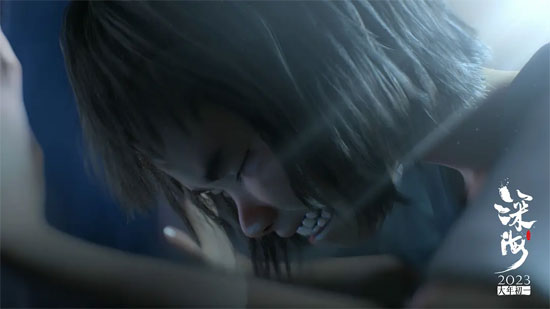
Note that when I say the last half hour is good, it’s largely not because of the reversal – in fact, viewers with a little experience or thought can guess the design of the movie, such as the picture book of the Deep Sea Hotel, the little yellow duck life preserver, the candy-loving sea otter Sugar Pea’er, etc., all of which are more obvious hints.
Even if we know the truth of the latter reversal, it does not in any way detract from its great impact, because this abstract unreal world has been established, just slowly push it down, dismantle it, that emotional outpouring and flush will naturally come to fruition.
With that out of the way, it’s time to talk about Deep Sea’s unique special effects.
The biggest innovation of the movie is undoubtedly the original “particle ink” created by the movie team – they originally wanted to show the traditional Chinese ink elements with the most advanced technology, but the principle and style of the two are contrary to each other. So they refer to the floating form of dust particles in reality, and use hundreds of millions of particles to pile up the floating sense of ink.
These stills from the “Light Meets Sea” series are almost all scenes that have appeared in the movie, which are already beautiful just by looking at the stills, but not as much as one tenth of the dynamic performance on the big screen, so you can imagine the shocking effect.
As a matter of fact, with such a powerful self-developed engine, there should be more particles and ink drawings, but surprisingly, Deep Sea has been very restrained in its use, only appearing at the right time during a few important transitions and psychological activities of the characters.
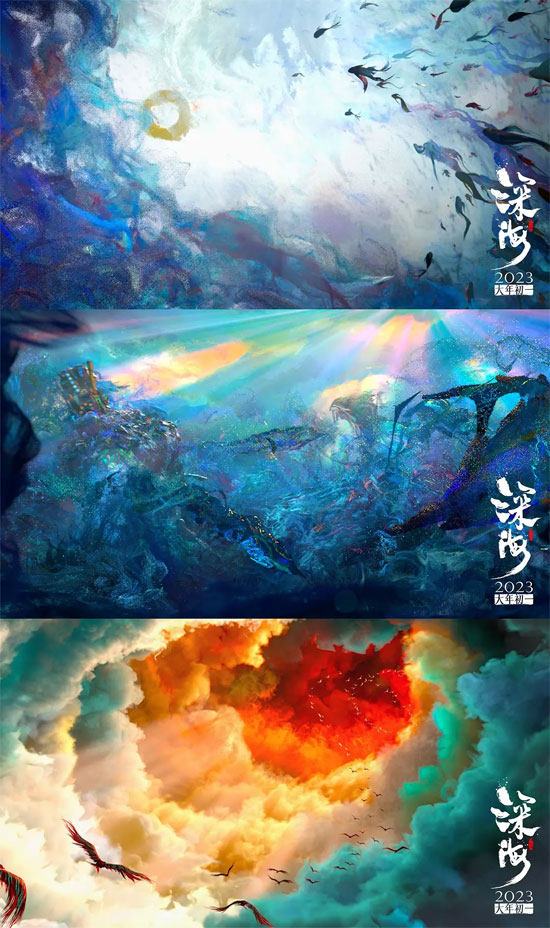
In other words, the movie doesn’t show off when it could have, but strictly lets the special effects serve the story, which is commendable (of course, computers can’t afford to be burned…).
Back to the theme of the film, “Deep Sea” is actually a very gloomy story, even in the fantasy world of colorful can not cover up its bleak and depressing background, the protagonist Samurai is always in a state of impasse, the most representative symbols, that is, the elusive red “ghosts of the dead” and black “sea sprites”. The most representative symbols are the red “ghost” and the black “sea spirit”.
The ghost of mourning is easier to understand, it originated from the red sweater left by his mother to Samurai, and then became Samurai’s isolation from the outside world, closed himself off, it is a gangrene-like depression, at any time and any place, may pounce on and devour the “mourning” Samurai.
The Sea Spirit is much more complex: on the one hand, it is a “good” seawater soup (fish love it, but people can’t), a metaphor for the fantasy of not being able to indulge while drifting on the sea; on the other hand, it is based on the ocean fairy tale that his mother told to Samurai when he was a young boy, and it is a mixture of nostalgia for his mother and anticipation for the unknown, which is why it is both a kindred spirit (in terms of image) and the hair of his mother (in terms of image, the hair of his mother). The image has both the hair and eyes of his mother, longing for her love), but also dangerous (oriented towards loss of control, and the self-knowledge of not being loved).
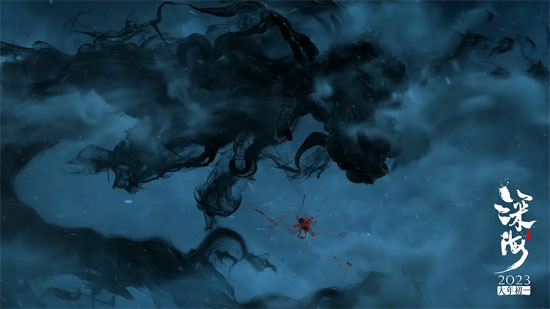
With the unshakeable ghosts in the back and the sea sprites in the front that can’t get out of their way, they’re choosing people in different ways… Is there really a way out for Samjou? Besides, mom is just a vague thought, even if she does come back, can everything really get better?
When you think about it, the depressing nature of Deep Sea can’t be stopped, plus the expression of the movie’s image in this regard is really a bit “grammatical”, and the effect of emo and psychological thriller is top-notch (so it’s not recommended to take children to see it).
Fortunately, the movie still leaves us a ray of hope.
The names of the two protagonists of Deep Sea originated from director Tian Xiaopeng’s hobby of stargazing, because the three brightest stars in the winter sky are Nanhe San, Senkou Si, and Sirius – Director Tian said that Senkou Si was still an exceptionally bright red giant in 2015, and dimmed behind it, and that Senkou’s destiny is much like it, unstable and ready to could explode and devour itself.
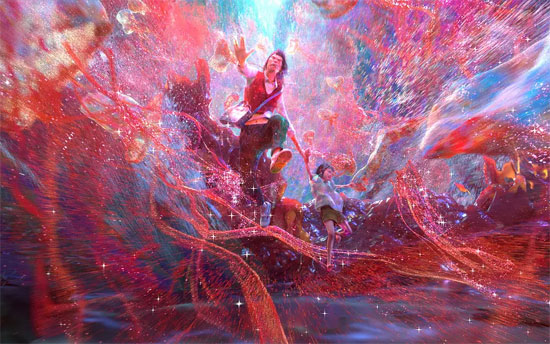
Nine-year-old Senjuku is a sensitive little girl, due to childhood experiences forced to mature and “understand”, like her depression is the most troublesome, on the surface does not seem to be any abnormal, in fact, has lost its self, no sadness, no joy, will only hang to please others fake smile, inside a sticky dead silence.
In reality, such depression is difficult to cure …… but just like the heavenly Nanhe San will shine on Samjou Si, we also want to believe that Samjou will be in the South River with the life entrusted to the unswerving, began to genuinely cry, genuinely laugh, in the brighter sunshine to live, grow up.
Deep Sea did justice to the tears I shed at the end of the movie.
Deep Sea” is a good movie, but it is not a movie that can make people ‘head over heels’, and it may even make people feel an instinct to run away……. However, it is the movie that Tian himself wanted to make, without compromising, without flattering.

May all the lonely, introverted and depressed children in the world find their way home.
May all the wounded, dusty, gray hearts in the world have precious care.
Happy New Year.
Please specify:Anime Phone Cases » Deep Sea 2023 Film Review: The Lonely Child Comes Home